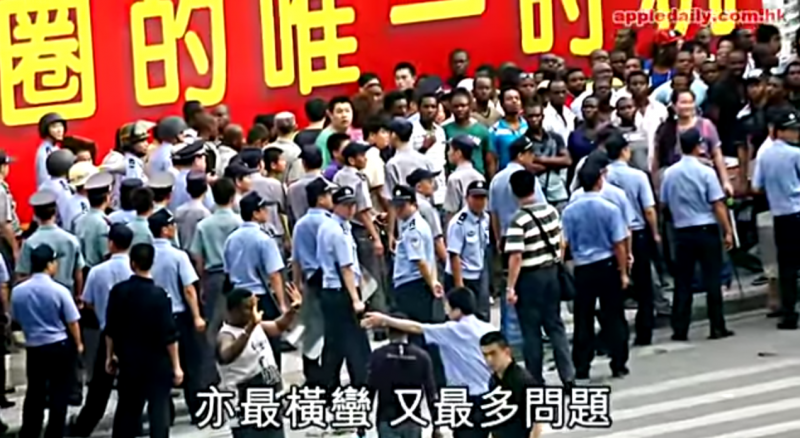 [1]
[1]Screen capture of Apple Daily's video report from 2012 of Africans protesting in Guangzhou over the suspicious death of a Nigerian while in police detention.
As racial injustice makes headline after headline around the world, with a particular emphasis on the American city of Baltimore, a dialogue has been opened on issues of race and xenophobia within mainstream media.
And it’s not just within the US. Chinese Internet users have also posted countless racist remarks [2] against people of African descent when commenting on the incident.
China is experiencing a huge wave of African migration into major industrial areas such as Guangzhou, and as such tensions have arisen as Africans attempt to assimilate into Chinese society.
Gordon Mathews, an expert in the study of African diaspora in China, pointed out [3] in a recent interview with a magazine that more and more Africans were married in China. He found in his research that about one-tenth of the Africans had Chinese wives or girlfriends and they on average give birth to 200 African-Chinese children every year in Guangzhou.
One of the obstacles to African assimilation stems from China's strict control of the foreign population, which also indirectly helps the spread of racial stereotypes. In September 2013, new visa and residence permit regulations for foreigners took effect, [4] which made it more difficult for individuals without corporate or institutional affiliations to work and do business in China than before. Once they overstayed without a valid visa, they would be subjected to a 500 yuan (approximately 80 US dollars) daily fine. According to a widely quoted media report [5] in August 2014, the Guangzhou authorities have only issued about 30,000 resident permits to Africans, while there were around 300,000 undocumented Africans residing in the city, many of them in the trading business.
In the Guangzhou case, 90 percent of Africans are undocumented because they failed to obtain a visa. They are frequently seen [6] in the police station detention cells and hence the stereotype that Africans are associated with criminal activities is commonly shared among Chinese.
Conversations about Chinese xenophobia and overt racism towards African immigrants have emerged, and despite the greater economic partnership between China and African countries, socially, there is still progress to be made.
Attitudes expressed online and through social media have suggested a deep xenophobia amongst Chinese citizens towards Africans within China. Apart from the Baltimore riots in the US, another recent case that stirred racist remarks online was the reaction towards the arrest of a “foreign” triad gang called “freedom fighters” [7] in April. Comments from users honed in on the race of the triad members:
外国人在中国撒野真是软弱.中国坚决不能容忍任何黑恶势力的存在!是时候对那些非法滞留的黑人采取措施了
Foreigners bullying around in China reflects their weakness. China should not tolerate the existence of such evil forces. It's now high time for us to take action against the illegal black people residing [in China].
The above comment is liked by more than 1,670 users.
The majority of the comments were nationalistic with a strong sense of territorial claim, while a few were virulently racist, claiming Africans were of an inferior race, like this one with 14 likes:
黑非就是一群被上帝遗弃的人民。什么埃博拉,什么艾滋。都是黑非开始的。基因中除了暴力还有什么。亚人类的身体结构。大脑容量比我们中国人少个400c。
Black Africans are a group of people that God has forsaken. Ebola, AIDS, etc. all originated from black Africans. Their genes are full of violence. They have sub-human body structure. Their brains are 400cc smaller than we Chinese.
The explicit tone and underlying xenophobia displayed online is disturbing; the implication that such views speak for the entirety of the Chinese people is highly questionable.
Emmanuel, a Ugandan student who has been studying in Beijing since 2010, told Global Voices in an interview via WeChat that Chinese xenophobia tends to be exaggerated on the internet:
People tend to be much braver online where there's no fear of identification or retribution. Most people that spout racism online are generally people who've had no contact with black people or have been slighted by one and then hate all of them.
He pointed to a herd mentality that exists online — people influenced by current trends and opinions have a tendency to absorb popular views even if they don't hold that same bias deep down:
Many will spew hate online to feel better about themselves but will genuinely be excited to meet a black person in real life.
He did, however, acknowledge there were those who held a “subconscious bias” towards Africans and foreigners in general, but these were not people he came across in his daily life. Indeed, what proves to be the most influential in Chinese perceptions of Africans is the media and the internet at large:
It would need the global image of Africans to improve first. The perception could change in places with many Africans but not elsewhere.
It then becomes a question of time as to whether greater integration between the African communities within China will bring about a more positive perception of Africans and foreigners at large. If the economic partnership between China and Africa is to prosper within the coming years, then domestically social cohesion between the two groups is of the upmost importance.